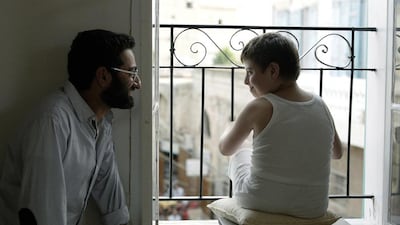When you think of Lebanese cinema, chances are you have one of two very distinct images in your mind.
Gritty, festival-pleasing, war-inspired dramas, such as West Beirut and Under the Bombs. Or the breezy, woman-centric comedies, including Caramel and Where Do We Go Now? by the director Nadine Labaki.
Enter Ghadi, stage left. After modest commercial success at home – the film opened in October 2013 and clocked 77,000 admissions during a 10-week run, making it Lebanon's seventh biggest release of the year – the film has enjoyed a sudden, surprise rise to fame on the festival circuit.
Since its international premiere at South Korea's Busan International Film Festival in October last year, Ghadi has won three audience-choice awards – at Busan, at Germany's International Filmfestival Mannheim-Heidelberg and at the Arabian Sights Film Festival in the United States.
It was also Lebanon’s official Oscar entry (although it didn’t make the Academy’s shortlist).
And now Ghadi is getting an international cinema release, starting with the UAE, where it will be released tomorrow. Cinema rights have already been sold in Spain, Poland and South Korea, and an on-demand deal has been signed in South America.
Set in a small, rural and distinctly Lebanese Christian village, the film is the heart-warming story of Ghadi (Emmanuel Khairallah), a young boy with Down syndrome. When his family are threatened with eviction from their home by intolerant neighbours who are tired of the noises he makes, Ghadi's parents concoct a (largely successful) plan to convince the village-folk that their son is, in fact, an angel.
On paper, it sounds ridiculous. But Ghadi is directed with an infectiously light-hearted zing, and the idea of a self-contained, gossip-fuelled provincial community is far from unique to Lebanon.
“The film has a lot of Lebanese character,” says the first-time director Amin Dora. “But I believe the story can be understood by everyone. This was my goal, but it really exceeded my expectations. To go to South Korea and see people relate to the film – this is what amazed me.”
The writer and star Georges Khabbaz – a well-known television and theatre actor in Lebanon, plays Ghadi’s father, Leba. Khabbaz says he got the idea for the script after working with Down syndrome children in his home country.
It was the 39-year-old’s first encounter with people who have been labelled “different”.
“We have a major problem in Lebanon and the Middle East in general – we don’t tolerate differences. I went from the principle that if we cannot accept someone who is different just because they are born different, how are we going to accept other differences, like ideology or religion?”
This universal plea for tolerance is one that translates across cultures. One of the best expressions of this in the movie is a showcase of the uniting powers of music: the arrival of the first piano in the village, when Leba is a child, is shot like a messianic miracle. It’s no coincidence that when the child grows up and follows in the piano owner’s footsteps to become a music teacher, he has a strong penchant for Mozart.
“Mozart himself had many handicaps and initially, the predictions were he would live only two years,” says Khabbaz, a pianist. “He ended up living 34 years and left behind a heritage that is incomparable.”
Despite a whimsy bordering on caricature, there’s a warm, enveloping feel to the film’s locale – perhaps because it was inspired by, and filmed in, the real village Khabbaz grew up in.
The script’s best running joke is that half of the men in the village are named Elias, after the local patron saint. In Khabbaz’s hometown, most of the men were called Stephen.
Significantly, director Dora chose to recast the town as a fictional, fairy-tale place, cut loose from the conflicts that preoccupy most filmmakers in the country.
“It’s a film from Lebanon, so if you want to put it in a real place, with a real time and history, then suddenly it will be related to many other events in history,” says the 34-year-old filmmaker. “So I decided to put it directly in a timeless, fantasy world.”
The producer of Ghadi, Gabriel Chamoun, puts it more succinctly: "There is no war in Ghadi – the subject is totally non-existent – and this is more or less a first in Lebanese cinema."
It’s a refreshing approach for a project from the country’s film industry, which is enjoying a burst of productivity – only seven films were released each year in 2011 and 2012, but this more than doubled to 15 in 2013.
However, Chamoun warns that such an increase isn’t always positive.
“Lebanese people are very ambitious by nature, so everyone is trying to do something,” says the 52-year-old.
“Now some attempts – due to lack of budget or poor scripts or bad execution – are unforgettably harming the image of Lebanese cinema. The perception among the public becomes that Lebanese films are not good.
“But some others are doing the exact opposite. I have high hopes – we have a lot of talent in Lebanon and a lot of interesting stories to tell.”
• Ghadi opens in cinemas on Thursday, February 19
rgarratt@thenational.ae

